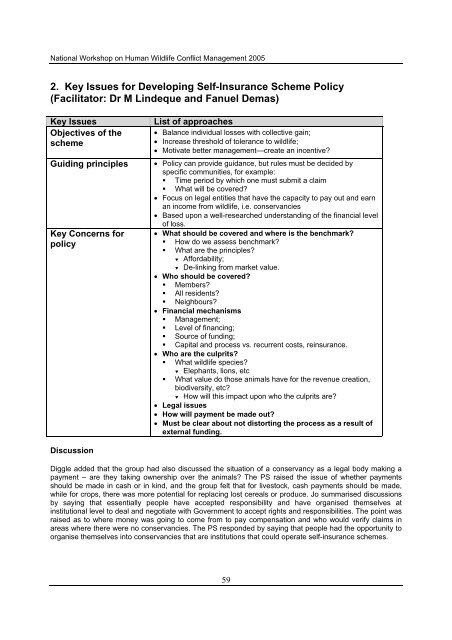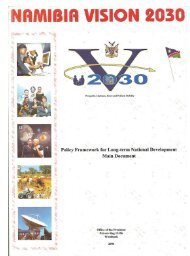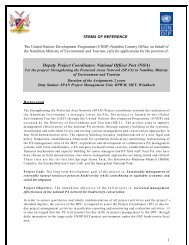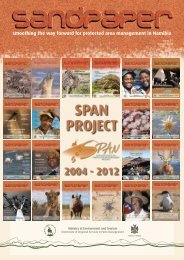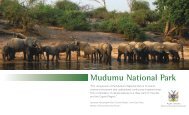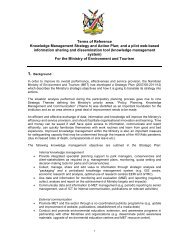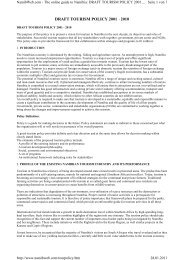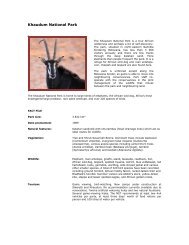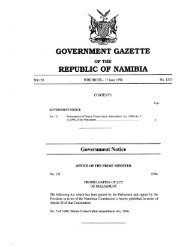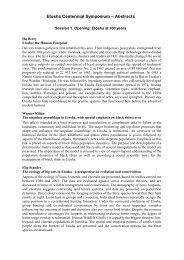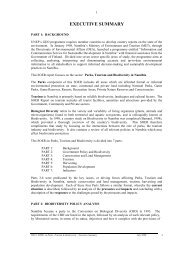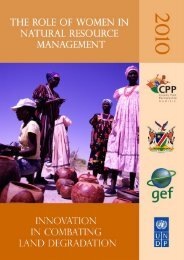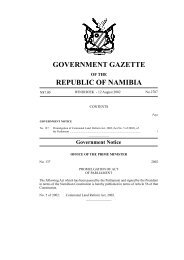HWCM - Ministry of Environment and Tourism
HWCM - Ministry of Environment and Tourism
HWCM - Ministry of Environment and Tourism
You also want an ePaper? Increase the reach of your titles
YUMPU automatically turns print PDFs into web optimized ePapers that Google loves.
National Workshop on Human Wildlife Conflict Management 2005<br />
2. Key Issues for Developing Self-Insurance Scheme Policy<br />
(Facilitator: Dr M Lindeque <strong>and</strong> Fanuel Demas)<br />
Key Issues<br />
Objectives <strong>of</strong> the<br />
scheme<br />
Guiding principles<br />
Key Concerns for<br />
policy<br />
List <strong>of</strong> approaches<br />
• Balance individual losses with collective gain;<br />
• Increase threshold <strong>of</strong> tolerance to wildlife;<br />
• Motivate better management—create an incentive<br />
• Policy can provide guidance, but rules must be decided by<br />
specific communities, for example:<br />
• Time period by which one must submit a claim<br />
• What will be covered<br />
• Focus on legal entities that have the capacity to pay out <strong>and</strong> earn<br />
an income from wildlife, i.e. conservancies<br />
• Based upon a well-researched underst<strong>and</strong>ing <strong>of</strong> the financial level<br />
<strong>of</strong> loss.<br />
• What should be covered <strong>and</strong> where is the benchmark<br />
• How do we assess benchmark<br />
• What are the principles<br />
Affordability;<br />
De-linking from market value.<br />
• Who should be covered<br />
• Members<br />
• All residents<br />
• Neighbours<br />
• Financial mechanisms<br />
• Management;<br />
• Level <strong>of</strong> financing;<br />
• Source <strong>of</strong> funding;<br />
• Capital <strong>and</strong> process vs. recurrent costs, reinsurance.<br />
• Who are the culprits<br />
• What wildlife species<br />
Elephants, lions, etc<br />
• What value do those animals have for the revenue creation,<br />
biodiversity, etc<br />
How will this impact upon who the culprits are<br />
• Legal issues<br />
• How will payment be made out<br />
• Must be clear about not distorting the process as a result <strong>of</strong><br />
external funding.<br />
Discussion<br />
Diggle added that the group had also discussed the situation <strong>of</strong> a conservancy as a legal body making a<br />
payment – are they taking ownership over the animals The PS raised the issue <strong>of</strong> whether payments<br />
should be made in cash or in kind, <strong>and</strong> the group felt that for livestock, cash payments should be made,<br />
while for crops, there was more potential for replacing lost cereals or produce. Jo summarised discussions<br />
by saying that essentially people have accepted responsibility <strong>and</strong> have organised themselves at<br />
institutional level to deal <strong>and</strong> negotiate with Government to accept rights <strong>and</strong> responsibilities. The point was<br />
raised as to where money was going to come from to pay compensation <strong>and</strong> who would verify claims in<br />
areas where there were no conservancies. The PS responded by saying that people had the opportunity to<br />
organise themselves into conservancies that are institutions that could operate self-insurance schemes.<br />
59


